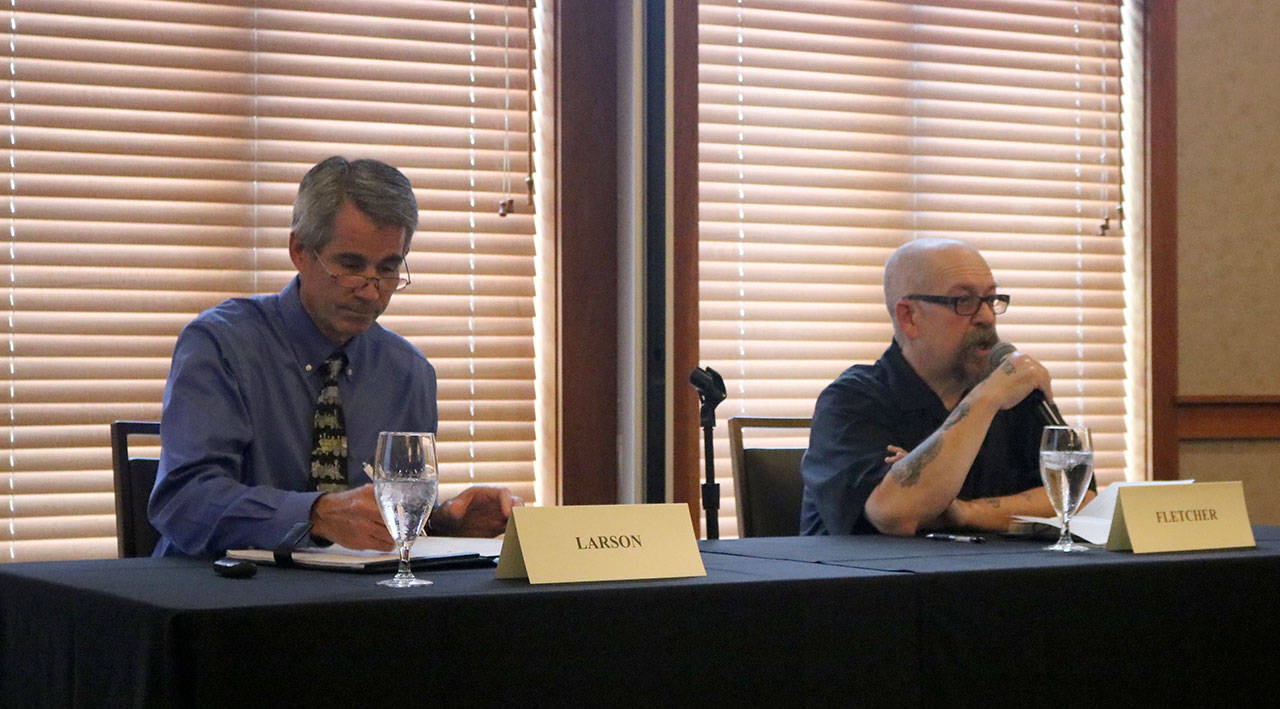The two candidates for the position of Snoqualmie Mayor drew a standing-room-only crowd at the Snoqualmie Valley Chamber of Commerce candidate forum on Wednesday, Oct. 25, at The Club at Snoqualmie Ridge.
The forum was part of the chamber’s monthly luncheon and featured both incumbent Matt Larson and challenger Fuzzy Fletcher answering a series of questions on various important topics on the city’s future. William Shaw, general manager of the Snoqualmie Valley Record, moderated the forum asking both candidates questions submitted by community members.
Fletcher kicked off the forum with his answer regarding the greatest risk to the continued success of the city of Snoqualmie. He cited the ever increasing property taxes, the lack of adequate jobs for people living in the Valley to work in Snoqualmie, and stressed the importance of responsible development.
Larson said the traffic was one of the biggest threats to the continued success of the city, as well as the lack of workforce. He cited affordable housing as something necessary to allow people at various economic levels to live and work in the city.
On the topic of growth and economic development, Larson talked about how the Ridge absorbed much of the residential growth and how the business park was rezoned to include more retail to help balance out the city’s reliance on property taxes. He said Snoqualmie does not need more residential development, and focused instead on the growth of businesses and tourism.
“The vision I constantly espouse is to make Snoqualmie an extraordinary place to live and a premier destination and anything we do has to meet both those goals,” Larson said. “We think uses oriented toward winery tourism at the mill site (are) right on, investments in downtown revitalization, work with the Northwest Railway Museum, the Salish expansion for lodging and for tourism to get those tourism dollars in town. You get four to five times more revenue with overnight guests than with passing visitors.”
For Fletcher, not only is more retail growth needed, he also wanted to see the growth of small businesses and incubator-type businesses that would allow small business owners to rent out space to work from. That would encourage more people to stay in the city and out of the Interstate-90 and S.R. 18 interchange.
“We really need to encourage small business. Those businesses that are here, we need to find a way, together, which is where your voice matters, to work together to lift the businesses up,” Fletcher said. “One of the ways to get more tax money is to grow the businesses that are here and show businesses why they need to come to Snoqualmie.”
When specifically asked about affordable housing, Fletcher said the current definition of affordable may not be affordable enough and that businesses would benefit from being able to have housing in town for their employees.
“I think we can attain a lot of that type of stuff by what I call incremental infill; there are spaces in the community that haven’t been built on yet and if the city facilitates changing, looking at changing or easing zoning, we would have more options for different kinds of housing,” he said. “If you can find a house you can live in for $100,000 or $70,000 that means single moms and many folks who aren’t making six figures have an opportunity to live in a house.”
According to Larson, Snoqualmie has already made important steps to pursue affordable housing without aggravating traffic. He used the mill site development as an example of a place where affordable housing could be used and where it would help to reduce traffic in and out of the city.
“We are starting to realize it’s more about being strategic about the type of housing because if we are not providing workforce housing in this community then we are exasperating the traffic. More housing actually mitigates that impact,” he said. “We revisited the mill site and we’ve have conversation of building up to 300 units of workforce housing, not just general market rate housing, but affordable workforce housing to be present for that project.”
The mill site development was another hot topic, as it was in each previous Snoqualmie candidate forum. Fletcher said he was extremely concerned about the contaminated parts of the property, as well as the potential traffic problems and damage it could do to other businesses in the city.
“I’m also extremely concerned about the businesses already existing within the city of Snoqualmie and how that would affect their income,” he said. “If we have two places selling beer and wine, one of them is huge and we are going to have a concert and the other one is downtown or on Center (Boulevard), they are not getting the business and we are not helping our existing businesses.”
Larson said many contaminated sites similar to the Snoqualmie mill site have been cleaned up due to the desire to redevelop the land. That redevelopment would help pay for the studies and cleanup, and the process would help to address the concerns people have about the property and its use.
“We don’t know the full extent of the contamination, but moving forward with development will get us there… there was a scoping process that was already done, we’ve done this in every single project including Snoqualmie Ridge and Salish Lodge,” he said. “All of the issues and concerns and fears, by law, are required to be fully addressed and studied whether it’s traffic, contamination, housing, schools, city service impacts.”
In their closing statements, both Larson and Fletcher restated their desire to keep improving the city and making sure that the next four years will move the city in a positive direction.


